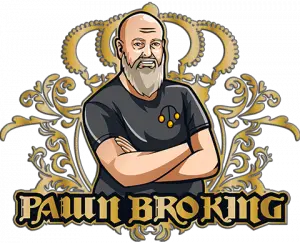There are many options for getting quick cash when you need it the most. You could apply for a traditional bank loan, but this process often takes weeks and can be inconvenient if your situation is urgent or just too far away from home to travel every day while waiting on approval. The next best thing would probably be selling items that have value, whether they’re personal possessions like furniture from our homes (which may have been given as gifts). Jewelry is worn every day -or something else entirely-, depending upon what type of person one happens to belong to.
Pawning your items as you normally do and getting them back upon repayment can help with the current financial need plaguing many Americans. On the other hand, using collateral for loans will only leave you vulnerable if there’s an emergency where cash isn’t available; however, it may provide some short-term relief while a more permanent solution searches its way into place.
But how do you know if it’s a good idea to pawn or sell your belongings?
You might be in a tough spot and need to make quick money. Or you may have an emergency coming up that will require funds but don’t want the hassle of selling your property right now (or ever). Either way, we’ve got both methods laid out for you below.
If no one has pawned their precious metals yet, this could very well serve as a solution before things get even more stressful. For those looking into how they can sell items like jewelry or electronics, etc., quickly without having too much inventory around, also consider our guide: “Pawning vs. Selling: What’s The Difference?” Just read on.
Why Pawning is Better than Selling
It is a question that depends on what you prefer. When pawning an item, it serves as collateral for the loan secured, and once paid back within an agreed time period, of course, one gets the valuable things (pawned). In contrast, when selling any goods/services, things are traded in exchange for money which can then be used by someone else who requires those particular service providers’ products or services. Whereas if we go down a traditional route where there could have been debt owed covering these expenses, many people end up not paying them off anymore, leading others into distress situations such as bankruptcy proceedings, etcetera.
Difference between Pawning vs. Selling: An Easy Guide
When you sell your items, it’s final. You lose ownership of the item and are left with an emotional scar if things don’t go well financially speaking- but this process can take days or months depending on how quickly people want to buy what we’ve got for sale. On the other hand, pawning our goods requires less time commitment than selling because all that needs doing is collateralizing them by using cash. Security against repayment at whatever rate specified by law in whichever state where said loan originated should any such legislation exist–usually around thirty percent (30%) APR).
Pawning your items is a great way to get an instant cash infusion, and it typically doesn’t require much emotional involvement. The process moves quickly as long you’re working with someone who knows what they are doing, has pawnshop access in their area, or can order one from afar if needed. You also maintain ownership of the goods while waiting on repayment – which means no more worrying about losing something important because there’s always hope that somebody might buy them back at some point (even though this does happen).
The Necessities of Pawning Your Stuff: What You Need to Know
Pawning is a great way to solve your short-term financial problems. Pawnshops are reliable and will evaluate the items you bring in, giving an amount of money that can be repaid when it’s time for repossession. Just make sure not to go into this lightly; only take up the offer if it’s something valuable enough like jewelry or high ticket electronics (like gaming systems).
One more thing before we part: I know pawn shops seem scary, but they’re very safe places because their main goal is just making any customers come back again by providing them with good service. It means friendly staff members who care about each other person’s situation as much.
What is Pawning?
Pawning is a clever way to get some money while you’re out, and pawn shops are easy enough that even kids can do it. All they need is an item with value such as jewelry or electronics for the transaction to go through without any issues.
Pawning allows people who have emergencies where cash isn’t available on time to access them when needed by surrendering their items. Under state-regulated interest, fees will be repaid over time at set rates depending on what type of loan one chooses from short-term loans less than 90 days long upfront rent payments.
The Importance of Pawnshops in the Economy
It is important to note that pawnshops do not carry simply any merchandise. The goods you may pawn generally include jewels, diamonds, technology such as computers, lawnmower machines, and luxury bags, as well as timepieces, branded jewelry, designer clothes, automobiles, and firearms (amongst other things). There are presently 14 billion dollars in revenue generated by the pawning sector. The United States alone has more than 11,000 pawn shops. Typically, pawning is an excellent alternative for you if you need an emergency loan. With the advent of the internet pawning, it’s even more convenient and fast to pawn stuff these days than ever before.
Pawning is an ancient practice that has been around for thousands of years. You bring your items to a pawn shop, and they will assess their value to lend you money using what’s called collateral – which can be anything from jewelry, electronics, luxury products, branded items, designer wears up into gold bars. And if you fail to pay on time before being given back possession- well, then not only does the store take complete ownership over everything. But so does any other person who may purchase those same goods at auction due solely because no one else was looking after them properly already.
Advantages of Pawning
- Your valuable possessions will always be waiting for you if you don’t have enough money to get them back.
- Pawning an item is a quick way to get money when you need it most while still getting your belongings back.
- If your gold jewelry, a diamond ring, or a designer handbag—pawning can help tide over cash flow issues so that it doesn’t seem quite so dire.
- You can pawn items at half their original value, which allows people who need cash quickly and are unable to wait months on end the option of borrowing from a lender with no interest rates.
- Pawning is a great way to get money when you need it.
- Items do not affect your credit score.
- Loans can be secured with even bad credit.
- Even if you default on the loan, there will still be no consequences on your credit.
- Quick and easy process
- No waiting time. In some cases, it could be the same day.
- Get cash when you need it with a pawn loan.
- Get your items back when circumstances improve, or if they don’t, you can sell them for more cash.
- Even if you didn’t get the loan from the bank, your valuable items are still yours with planning.
- When you pawn your valuable jewelry, not only will you get a small percentage (almost a quarter of the price), but it also ensures that you don’t lose ownership and pay penalties or fees.
- Unlike other options such as borrowing from friends/family, loaning money from another person, using your credit card to buy something quickly, etc., pawning is all about getting the best offer for goods at low prices and without adding a security deposit.
- It protects both parties: if we need our things back before our loan has been paid in full, we can take them back without any trouble whatsoever. There’s always agreement between the two parties: one party needs cash and doesn’t want the item.
Why is pawning more advantageous than selling?
As previously indicated, pawn shops provide short-term loans in return for your valuables. On the other hand, Pawnbrokers are a viable option for selling your belongings. The pawnbroker evaluates your belongings and calculates a price; you are then paid in cash right away. Selling your items to a pawn shop is that simple. Selling may be defined as the act of exchanging something of value for money. What if, on the other hand, you pawned your valuables and then got them back after paying back the loan?
When you sell anything, you relinquish all control over the object you were trying to get rid of. However, if you pay back the debt, you will have your pawned belongings back.
It’s also possible to borrow money and then re-patronize your belongings.
Final Thoughts: Pawning Items to Increase Profits
When you sell items, the person who buys them from your store completely owns what they purchased. When someone pawns something to repay money owed on a loaned item at an agreed price with time limits, if those conditions are met, then that borrower can reclaim their product just as soon as it’s paid back. But when selling these same items without any strings attached–you give up all claims over how large profit margins might be because there is no middleman involved.
With pawning, you know that you receive less money, but you may still acquire a new loan with the same products after you’ve repaid the loan. The sale of products is also something you are aware of as an effective way to get rid of things you no longer use. While it is possible to make a lot of money by selling your goods, you also know that it may be emotionally tough if you want to get your stuff back.
Hopefully, the information in this article will help you choose between pawning vs. selling methods for your goods.

Thomas Boseman is the author of Pawnbroking.com. A pawn shop owner by day, blog writer by night. When not writing, he enjoys exploring the outdoors with his dog, Roman. Thomas received his bachelor of arts in film from the University of Arizona. A Brooklyn native, Thomas is a lover of filmmaking, motorcycle, and coffee.
